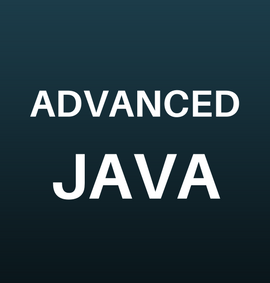
Advanced Java Web development
ADVANCE JAVA
1- SQL Basics
2- Java Database Connectivity
- What is JDBC ?
- What is role of drivers ?
- Steps for connecting with database.
- Using type-4 driver for database.
- Interaction of JDBC API with DBMS.
- Using Statement interface to get data.
- Data fetching methods of ResultSet
- Inserting, Updating, Deleting a Record by Statment interface.
- Updatable Methods of ResultSet.
- Scrolling methods of ResultSet.
- Scrolling constants of ResultSet.
- Types of Drivers.
- PreparedStatement Interface.
- Using PreparedStatement to Fetch, insert, update, delete data.
- Creating a Stored Procedure.
- CallableStatement Interface.
- Calling the procedure.
- What is ResultSetMetaData interface.
- DatabaseMetaData interface.
- Transaction Management.
3- HTML BASICS
4- Servlet
- The Hypertext Transfer Protocol (HTTP).
- The Three-Tier Architecture.
- Developing Web Applications in Java.
- Static Webpage Vs Dynamic Webpage.
- What is Web Server ?
- What is Servlet?
- Features of servlet.
- Servlet Architecture.
- Servlet class Hierarchy.
- Steps to create a servlet.
- Diiferent Process of Creating Servlet.
- Servlet life cycle method.
- What is Context Folder & it's Naming Convention.
- What is deployment descriptor file & its creation.
- Creating url-patten for Servlet.
- How to run servlet.
- Calling Servlet from browser.
- Passing data from HTML file to Servlet.
- Submitting data to servlet.
- Database Access from Servlet.
- ServletConfig interface & use.
- What is User Tracking.
- URL Rewritting
- Hidden Field
- Cookie(Persisent Cookie, Non Persistent Cookie)
- Session.
- Example of 4 types of User Tracking.
- Permanent servlet
- Servlet Context interface & use.
- Type of variable in Servlet and example.
- Forwarding & including request(Servlet chaining or Servlet Collaboration).
- RequestDispacher interface.
- Difference between forward() and sendRedirect() method.
- Servlet Concurrency or Thread-Safe Servlets (Implementing SingleThreadModel interface).
- Using Servlet Filter.
- FilterConfig Interface and use.
- PrintWriter vs ServletOutputStream.
- Accessing a Servlet by any name(Hitting a servlet by any name).
- Refreshing a Servlet automatically.
- Downloading file from Servlet.
- Servlet Events & Listeners.
5- Introduction to CSS
6- Introduction to Javascript
7-JSP(Java Server Pages)
- What is Java Server Pages (JSP)
- Benefits of JSP.
- Features of JSP.
- LIFE CYCLE OF JSP.
- CHARACTERSTICS OF JSP.
- CREATION PROCESS OF JSP.
- CONTENTS OF JSP.
- DIRECTIVE TAGS.
- DECLARATION SECTION/TAG.
- CLIENT END SCRIPTING TAG.
- HTML.
- JSP TAG/ACTION TAG.
- SCRIPTLET TAG
- EXPRESSION TAG.
- JSP COMMENTS.
- JSP IMPLICIT OBJECTS.
- Sending request from html to jsp
- Retrieving data from database table :
- Submitting Request JSP to itself.
- Using DataBase in JSP with life cycle methods :
- USER TRACKING : It can be achieved by followings: -
- Url rewriting
- Hidden field
- Cookie
- Session
- INCLUDING AND FORWARDING THE REQUEST.
- STATIC INCLUDE.
- EXCEPTION HANDLING IN JSP.
- JAVA BEAN.
- Bean Properties (data member)
- Bean Methods
- Bean Event
- Creating Bean class.
- Using Bean class in jsp.
- Replacement of<jsp:setProperty>.
- Requirement for creating Custom tag.
- cCreation process of tag class:-
- Creation process of TLD.
- Using PageContext.
- The JspWriter Class.
- Using a plugin in a jsp file.
- Attributes of <jsp:plugin>.
8- Expression Language(EL)
9- JSTL (JSP Standard Tag Library)
10- AJAX
11- Demo Project
Trainer
Gitesh Mallick
Mrp Price
₹ 8000
Discount In Percentage
13% off
Discounted Fee
₹ 7000
Duration
70 Hr
